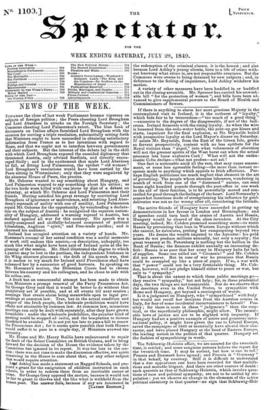The active friends of Hungary have succeeded in getting up
i demonstrations in her favour n London and Birmingham ; and if speeches could turn back the armies of Austria and Russia, Hungary would be cleared of the alien intruders. At the City meeting, indeed, Mr. Cobden promised something more—to resist Russia by preventing that loan in Western Europe without which she cannot, he calculates, prolong her campaigning beyond two years. He denies the wealth imputed to the Autocrat : his gold mines do not produce millions annually, but only a royalty ; the great treasury at St. Petersburg is nothing but the bullion in the Bank of Russia ; the finances exhibit annually an increasing de- ficit: Russia is so poor that her army in Hungary halts for lack of supplies. Some one called out " Circassial" and Mr. Cobden did not answer. But in case of war he promises that Russia could be crumpled up like a piece of .paper. If so, a war with that " power " could not be a very formidable thing. Mr. Cob- den, however, will not pledge himself either to peace or war, but only to "sympathy." That is about the extent to which these public meetings go— they resolve " sympathy," but not help ; for, in these prudential days, the two things are not inseparable. Nor do we observe that the meetings even in the United States, to sympathize with Rome and Hungary, get beyond a contingent of words. Is it a judgment on Hungary, who " sympathized " with Italy but would not recall her denizens from the Austrian armies in Italy, for fear of some incidental inconveniences to herself? Pos- sibly ; for there is more in these " judgments " than the scep- tical, or the superficially philosophic might allow. The immut- able laws of justice are not to be slighted with impunity. If Hungary had set a positive example of active and generous inter- national policy, it might have given the cue to Liberal Europe, saved the campaigns of 1849 or materially have altered their cha- racter, and have placed Hungary at the head of Eastern Europe, the leading nation in the politics of that quarter. Hungary set the fashion of sympathizing in words.


























